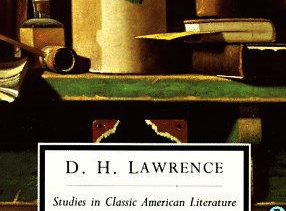Can Fiction Improve Us? Yes, That’s What It’s For

In the midst of an intense meditation on Walt Whitman in his Studies in Classic American Literature, D. H. Lawrence suddenly proclaims:
The essential function of art is moral. Not aesthetic, not decorative, not pastime and recreation. But moral. The essential function of art is moral.
But a passionate, implicit morality, not didactic. A morality which changes the blood, rather than the mind. Changes the blood first. The mind follows later, in the wake.
I keep thinking of this passage, with its mixture of inspiration and exasperation, as I follow the recently reheated debate over the moral value of fiction. In his new and much-discussed study The Storytelling Animal, Jonathan Gottschall draws on contemporary psychological research to argue that fiction, on balance, is good for us. As I haven’t yet read the book, I’ll quote from his summary last month in the Boston Globe:
…perhaps the most impressive finding is just how fiction shapes us: mainly for the better, not for the worse. Fiction enhances our ability to understand other people; it promotes a deep morality that cuts across religious and political creeds. More peculiarly, fiction’s happy endings seem to warp our sense of reality. They make us believe in a lie: that the world is more just than it actually is. But believing that lie has important effects for society—and it may even help explain why humans tell stories in the first place.
Adam Gopnik has since written a scathing refutation in The New Yorker’s book blog, while Will Wilkinson in this forum has added not one but two skeptical rebuttals. “‘Art is good for you’ arguments,” he writes, “almost always get my hackles up. Because what if it isn’t?”
This debate is an ancient one, with too many highlights—Plato’s banishment of poets in the Republic, “art for art’s sake,” and on and on—to revisit fully in a short article. Of course, it’s only recently that science has claimed to offer objective research on the matter, and Wilkinson rightly mocks the crudity of some of these studies. (In one, subjects primed with “humanizing” fiction proved more likely to pick up a researcher’s dropped pens.) Yet while sharing his skepticism to a point, I can’t help feeling that it leaves something out. The question of whether, as he puts it, “there is something inherent in the nature of stories that lends them a morally progressive bias” is not a very interesting one. Obviously there are junk stories just as there is junk food, and gorging yourself on either will do you more harm than good. The more interesting question is whether, in the case of stories, there’s such a thing as a diet that actively makes you healthier.
***
A common knock on Gottschall’s argument is that even people steeped in great literature—literature professors, for example—are no more or less moral than the rest of us. Novelist Mary Gordon made this point in TheAtlantic in 2005, and Gopnik repeats it in his New Yorker essay:
Surely if there were any truth in the notion that reading fiction greatly increased our capacity for empathy then college English departments, which have by far the densest concentration of fiction readers in human history, would be legendary for their absence of back-stabbing, competitive ill-will, factional rage, and egocentric self-promoters; they’d be the one place where disputes are most often quickly and amiably resolved by mutual empathetic engagement.
The most this spoof proves is that human nature is relatively constant, that fiction can’t turn us into outright saints. But who’s claiming that it can? A fair follow-up question would be whether literature professors, on average, do more or less harm in the world than members of other professions. Maybe they wreak all kinds of havoc, unbeknownst to me; but it seems worth noting that most of the ones I’ve met are fairly quiet, contemplative, passive types. True, passivity itself can be a moral weakness, and some individual professors are terrible people. But if the worst we can condemn this group for on average is academic politicking, I’m not sure that alone is evidence against the improving effects of fiction. I can think of many professions—lawyer, used car salesman, Wall Street trader—about which nobody would have trouble making harsher generalizations.
Another red herring dropped on both sides of the debate concerns fiction’s immediate moral impact. If researchers are hoping to demonstrate this, Wilkinson’s right to be skeptical: the effects they find won’t survive outside the lab. But serious proponents of art’s moral value know that this claim is weak. Dignifying it risks distorting their argument, as Gordon does in an outlandish thought experiment:
A month or so ago I read an account of an event that took place in Atlanta earlier this year. During his trial for rape a man overpowered one of the courtroom guards, stole her gun, and killed three people. Escaping, he ended up in the home of a twenty-six-year-old woman, and took her hostage. While she was his prisoner, the woman read to him from the inspirational book The Purpose-Driven Life, by Rick Warren. The accused rapist saw the error of his ways and surrendered to the police. When this event became public, the book shot to No. 1 on the New York Times best-seller list. Ask yourself: can you imagine this happening if she had read to him from one of the great classics of moral fiction—from Middlemarch, or Jude the Obscure, or Moby-Dick, or War and Peace?
The deck this stacks against Tolstoy is thicker than his novels. To judge the impact of War in Peace you need to judge it in full, and it’s hard to hold a kidnapper’s attention for 1200 pages even if they’re the most morally beneficial pages on earth. (Still, who’s to say the tactic wouldn’t at least confuse him? And didn’t something similar work for Scheherazade?)
Let’s make the thought experiment a little fairer. Later in her Atlantic essay Gordon argues from another anecdote, in which she meets a fan of her books who turns out to be a racist. Put aside the question of Gordon’s objectivity here, and suppose you were to sit this racist woman down for a semester—under the guidance of a skilled, patient professor—with the complete works of James Baldwin. Would she emerge a full-throated champion of social justice? Probably not. Would she shed some of her more ignorant assumptions about black people? Having spent some time inside the mind of an extraordinary black person, a moral pillar and creative genius, she just might. Or are we prepared to neuter Baldwin’s whole enterprise by claiming his work couldn’t have this effect?
***
No one in today’s debate is arguing, like Plato, that fiction is downright immoral. Gordon, et al. believe essentially that it’s amoral; that is, they’re endorsing Oscar Wilde’s argument from the Preface to The Picture of Dorian Gray:
There is no such thing as a moral or an immoral book.
Books are well written, or badly written. That is all.
…
No artist has ethical sympathies. An ethical sympathy in an artist is an unpardonable mannerism of style.
…
All art is quite useless.
I know I contradict Wilde at my own risk, but I’ve always found this argument disingenuous—or at least an invitation to misunderstanding. Like all great comedians, Wilde was every inch a moralist. The statements above are plainly a series of moral claims, contrarian and ironic though they may be. In fact most of his famous epigrams are conventional moral statements, turned on their ear to expose their hypocrisy:
Anyone who lives within their means suffers from a lack of imagination.
One should never listen. To listen is a sign of indifference to one’s hearers.
The amount of women in London who flirt with their own husbands is perfectly scandalous. It looks so bad. It is simply washing one’s clean linen in public.
Arguments are to be avoided; they are always vulgar and often convincing.
In other moods Wilde did away with humor altogether, and simply preached. (“He who would lead a Christ-like life is he who is perfectly and absolutely himself.”) And Wilde, like Lawrence, worshipped that shameless pagan priest Walt Whitman.
If one of the champions of “art for art’s sake” had such earnest moral designs on his readers, where does that leave the rest of us? I’ll be blunt: I side with Lawrence here, and with the novelist-critic John Gardner, who spent much of his career insisting that art is profoundly moral in its aims. The best of it, he wrote,
clarifies life, establishes models of human action, casts nets toward the future, carefully judges our right and wrong directions, celebrates and mourns.
It does not rant. It does not sneer or giggle in the face of death, it invents prayers and weapons. It designs visions worth trying to make fact. It does not whimper or cower or throw up its hands and bat its lashes. It does not make hope contingent on acceptance of some religious theory. It strikes like lightning, or is lightning.
Gordon delicately questions this passage: “what would be the nature of the prayers it might invent? And what the weapons?” But it seems to me that a well-read person can’t even think about jealousy, say, without thinking of Othello. His example is a weapon against a certain kind of error, a “cautionary tale” all the more powerful for being nuanced and not didactic. The line Huck Finn mutters before choosing loyalty over racist law—“All right, then, I’ll go to Hell”—is an anti-prayer that comforts me whenever I’m trying to make the “wrong” decision for the right reasons.
“Changes the blood first. The mind follows later, in the wake.” This is how great fiction operates on our morals, slowly and at the margins. It doesn’t cure our worst faults (nothing does), but it does make us more aware of them, and of others’ inner lives. Meanwhile, lesser fiction tries to change the mind, or tug cheaply at the heartstrings—but no fiction is innocent of moral purpose altogether. All working storytellers (this would include Gordon, Gopnik, and Wilkinson) labor hardest over the moral issues at the heart of their projects: is this character represented honestly, or is she a caricature? Does my ending communicate complex human truths, or does it sentimentalize and reinforce the reader’s pieties? Even if stories don’t succeed in making us better, they sure as hell try. To deny this seems like the ultimate tall tale.
[Image: D. H. Lawrence, Studies in Classic American Literature, Penguin Twentieth-Century Classics edition. Courtesy B&N.com.]





